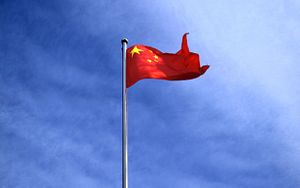On April 13, China’s Foreign Ministry lashed out at Japanese newspaper Yomiuri Shimbun for a news commentary blaming the communist party of China for the COVID-19 crisis. The Global Times followed suit with an editorial to criticize the article, stating that the writer should “be spiritually and mindfully independent and morally integrated as a Japanese.”
Censuring other parties for dissenting opinions is nothing new for Chinese government spokespeople and state media. Still, China has lately been stepping up its effort to counter global criticisms of its government for the outbreak of COVID-19.
After Peruvian Nobel literature laureate Mario Llosa blamed the Chinese government for covering up the epidemic without proper handling, China’s Foreign Ministry told Llosa to “discard his prejudice and look at the issue in an all-round, correct manner and view China objectively and fairly.” In another case, Brazilian President’s son Eduardo Bolsonaro enraged Beijing by tweeting, “The blame for the global coronavirus pandemic has a name and surname: the Chinese Communist party.” The Chinese embassy hit back by remarking that Bolsonaro has caught a “mental virus that is infecting the friendship between our people” and that the Bolsonaro family is “poison” for Brazil.
These numerous cases of diplomatic belligerency reveal the issue with the doctrine that diplomacy and overseas propaganda must pledge absolute loyalty to the Communist Party. China’s belligerent rhetoric became more intense after Xi Jinping and Foreign Minister Wang Yi instructed Chinese diplomats to display a stronger “fighting spirit” in the face of international challenges. This inflexible dogmatism has forced China to take an aggressive stance in the current globalized but pluralistic world, home to many differing opinions.
Whether it be a scholar, a journalist, or a celebrity, any individual with negative comments about China could instigate a response from Beijing.
The negative repercussions of Beijing’s sensitivities are evident. While engaging every side in full-fledged narrative warfare may reinforce China’s nationalism at home, the belligerency is antithetical to the image of a “responsible major power” China is trying to portray and undercuts Xi’s vision of “building a community with a shared future for mankind.” It has also been a gift to anti-China hawks pushing the “China threat” rhetoric. In addition, criticisms of other individuals and the countries they represent could also stir negative sentiments and incur nationalistic backlash abroad, which is already happening from China’s mockery of other countries’ responses to the virus.
Finding enemies everywhere is only one side of the problem in China’s one-size-fits-all style of diplomacy and propaganda. China has also been attempting to “unite all fronts” by framing individuals as supporters of China regardless of whether that serves the purpose of improving China’s foreign relations and national image or not.
Beijing had backed Taiwan’s Kuomintang candidate Han Kuo-yu during Taiwan’s 2020 election even though Han was losing votes from being coined Beijing’s “preferred candidate.” Beijing unflaggingly supported Hong Kong’s embattled Chief Executive Carrie Lam through public endorsement and launched easily identifiable misinformation campaigns. Beijing presumably could have comparatively mitigated public discontent in both cases by refraining from promoting individuals already suspected of representing its political interests.
China may or may not have acknowledged its credibility deficit, but its obsession with government representation has discredited individuals seeking to disassociate from Beijing’s political presence. Many of China’s political and economic interests would have been better served if the propaganda arm hadn’t ramped up waves of paranoia over Communist Party influence.
Such was the case when Huawei was arduously trying to convince the United States and other countries of its independence from Chinese intelligence. Rather than negotiating under the table, Chinese officials conspicuously defended Huawei, and Chinese state media criticized the U.S. and Canada in a coordinated manner, which made it difficult not to draw lines between Huawei and China’s opaque political maneuvers.
As a result of the government’s obsession with “uniting the front,” many voices from Chinese society have become tainted with the endorsement of Party propagandists. That further limits China’s channel for voices to communicate effectively with other parties.
A day after The Diplomat published an “Open Letter to the People of the United States From 100 Chinese Scholars,” the Chinese Foreign Ministry and state media scurried to endorse the article. The letter, which called for cooperation and end to politicizing the pandemic – the imperative for leaders right now – was met with suspicious voices identifying it as a maneuver to push the “community with a shared future for mankind” narrative. Former U.S. national security consultant Joseph Bosco and Stanford University researcher Graham Webster, in discussing the letter with Radio Free Asia, each separately noted that Beijing likes to promote a narrative that “China is also a victim.” Ying-Yu Lin from Taiwan’s National Chung Cheng University described the letter as part of the Chinese government’s double-pronged approach, which uses “notable Chinese scholars to express goodwill while, on the other hand, attacking the U.S. through official channels and state media.”
In another open letter, 100 China experts and senior political figures quoted Xu Zhangrun to refer to the Chinese scholars’ letter as the “ridiculous ‘Red Culture’ and the nauseating adulation that the system heaps on itself via shameless pro-Party hacks who chirrup hosannahs at every turn.”
It is to no surprise that China’s media has been lackluster in improving its image among liberal democracies despite the scale of China’s propaganda campaign. The CCP’s compulsion with “finding enemies and uniting the front” created the “China-vs-all” scenario and thereby constricted partnerships. The purpose of propaganda is, after all, not to alienate the audience.

































